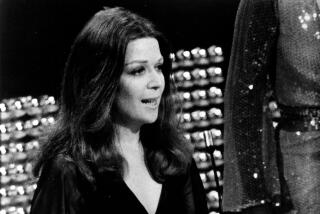Inspiring Exceptions to Youth-Obsessed TV
- Share via
Grow old along with me!
The best is yet to be . . .
--Robert Browning
U.S. television got rolling in earnest about 50 years ago. That makes it older, ironically, than nearly all of those granted prominence in this youth-adoring venue where graying is rarely honored and advertisers believe older than 49 equals obsolete.
Even as Americans live longer and longer, TV has been stiffing the 50-plus crowd for years, either by omission or distortion through stereotyping. There are, of course, plenty of seniors who are doddering. But plenty more who aren’t.
So regardless where one might stand on TV’s latest drift toward dumbed-down quiz shows, it’s nice to see Regis Philbin--whose 65 years makes him a fossil by TV standards--get a top gig in prime time on ABC’s “Who Wants to Be a Millionaire.” Nice, too, if only because of their ages, to see Della Reese, Dick Van Dyke, Barbara Walters, Dan Rather and Mike Wallace (with his fellow “60 Minutes” oldies) hanging on by more than their fingernails.
Nice, also, to see PBS schedule a coming hour of readings and poetry, titled “Grow Old Along With Me” after a famous Robert Browning poem, and featuring the aging likes of James Earl Jones, Hume Cronyn, Julie Harris and Richard Kiley, who died last March just before his 79th birthday.
And really, really nice to encounter ABC’s “Tuesdays With Morrie,” which Sunday brings to the screen Mitch Albom’s sweet, likable memoir of his intimate visits with a 78-year-old dying man he hadn’t seen for years. Albom, a well-known sportswriter for the Detroit Free Press, first told his story in a bestseller.
Morrie Schwartz was Albom’s college sociology professor, his “final course,” as he calls it, becoming their Tuesdays together as the teacher speaks aphorisms and other insightful sound bites into the tape recorder of his former student while succumbing gradually and painfully to ALS, or Lou Gehrig’s disease.
My wife had a close friend with Lou Gehrig’s disease. His name was Ronn Leeb, and like Morrie, inside that gnarled package his mind remained agile, his passions for life intact up to the day of his death.
While watching Jack Lemmon do his best work in years as the atrophying Morrie and Hank Azaria perform ably as Mitch, your thoughts may return to that “60 Minutes” episode showing a middle-aged man suffering with ALS being lethally injected by Jack Kevorkian at his own request. Although the man was heard asking to die, that televised euthanasia ultimately landed Kevorkian in a Michigan prison.
The difference is that Morrie, even while connected to tubes or gasping for breath, indicates no desire for a premature finale while somehow living to the hilt, in a sense, through the extreme distress. When Mitch asks if Morrie wants to teach him about dying, the old man replies: “No, not about dying. About how to live.”
Although tenaciously sentimental, “Tuesdays With Morrie” rarely panders or falsely manipulates under Mick Jackson’s direction while edging toward a predictable drenching downpour of tears. It generates emotion and expresses tenderness honestly.
Feelgood and inspirational at times, yes. If you’re hooked on happy endings, though, this is one to skip.
After learning of Morrie’s plight, Mitch begins flying to Boston weekly to renew their friendship. Soon, under Morrie’s influence, he’s restructuring his frantic life and priorities, paying more attention to his girlfriend, Janine (Wendy Monitz), and no longer seeking fulfillment as an obsessed careerist herding with his colleagues at the altar of know-nothing jocks.
The message here is the growing bond between these two men, with Mitch becoming a caregiver for his older, wiser friend whose physical erosion (Morrie tells Mitch he’s melting “like a candle”) is rarely accompanied by bitterness or self-pity.
Although easy to like, however, “Tuesdays With Morrie” is hard to love.
You would hope, for example, that what Morrie gave to Mitch in real life was more compelling than the platitudes Tom Rickman’s teleplay has Lemmon pouring out to a rapt Azaria. Sounding like Hallmark cards, they include: “Love is the only rational act,” “We must love one another or die” and “Aging isn’t just decay . . . it’s growth.”
Wondering about the last one, I decided to try it out on Mrs. Kramer, my senior advisor who at age 91 is among the clearest thinkers I know. Reaching her at her house in Los Angeles, I demanded to know if this decay versus growth business was on the level or merely propaganda from oldsters.
She was busy. “I’m looking at the most beautiful sunset,” she said.
About that Morrieism? “I think it’s true,” Mrs. Kramer said, “but it depends on the individual. You can just sit and die or you can be alive and interested in the world and lucky enough to have good friends like I do.”
Oh, come now. Aging can’t be all that great. “It has its drawbacks like every aspect of life,” said Mrs. Kramer, ever the realist. “Some of your equipment does begin to deteriorate.”
In her case, though, not the equipment inside her head. “I don’t know why,” she said, “but there are people like me who enjoy living alone and who have so many interests in books and things like that, they don’t feel lonesome. Others don’t live at all. They are beyond decaying, they are so miserable.”
I told her about the Morrie-and-Mitch movie, which--no escaping it--lingers on death as well as rebirth. “Some people fear dying,” she said, “and their old age is ruined by fear. But I don’t have that fear at all. I was thinking about it this morning. Why am I not afraid to die? I don’t know why, but I’m not.”
Tuesdays with Mrs. Kramer. She would have remained on the phone, but the sunset was waiting.
* “Tuesdays With Morrie” can be seen Sunday at 9 p.m. on ABC. The network has rated it TV-PG (may be unsuitable for young children).
*
Howard Rosenberg’s column appears Mondays, Wednesdays and Fridays. He can be contacted via e-mail at calendar.letters@latimes.com.
More to Read
The complete guide to home viewing
Get Screen Gab for everything about the TV shows and streaming movies everyone’s talking about.
You may occasionally receive promotional content from the Los Angeles Times.






